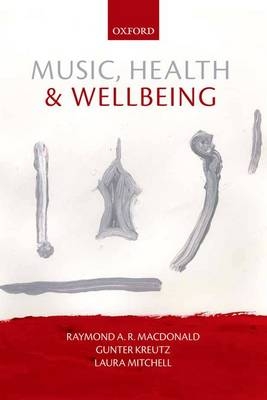
Music, Health, and Wellbeing
Oxford University Press (Verlag)
978-0-19-958697-4 (ISBN)
- Titel ist leider vergriffen;
keine Neuauflage - Artikel merken
The great saxophonist Charlie Parker once proclaimed "if you don't live it, it won't come out of your horn". This quote has often been used to explain the hedonistic lifestyle of many jazz greats; however, but it also signals the reciprocal and inextricable relationship between music and wider social, cultural and psychological variables. This link is complex and multifaceted and is undoubtedly a central component of why music has been implicated as a therapeutic agent in vast swathes of contemporary research studies. Music is always about more than just acoustic events or notes on a page. Music has a universal and timeless potential to influence how we feel. Yet, only recently, have researchers begun to explore and understand the positive effects that music can have on our wellbeing - across a range of cultures and musical genres. This book brings together research from music psychology, therapy, public health, and medicine, to explore the relationship between music, health and wellbeing.
It presents a range of chapters from internationally recognised experts, resulting in a comprehensive, multidisciplinary, and pluralistic account of recent advances and applications in both clinical and non-clinical practice and research. Some of the questions explored include: what is the nature of the scientific evidence to support the relationship between music, health and wellbeing? What are the current views from different disciplines on empirical observations and methodological issues concerning the effects of musical interventions on health-related processes? What are the mechanisms which drive these effects and how can they be utilised for building robust theoretical frameworks for future work? For the first time, research from disciplines including neuroscience of music, music therapy, psychophysiology and epidemiology of music, community music and music education is synthesised and presented together to further our understanding of music and health in one single volume, ensuring that closely related strands of research in different disciplines are brought together into a authoritative, comprehensive and robust collection of chapters.
This book is a timely and unique response to an explosion of interest in the relationship between music, health, and wellbeing and will be invaluable resources for students, administrators and researchers in the humanities, social and medical sciences alike.
Raymond MacDonald is Professor of Music Psychology and Improvisation at Glasgow Caledonian University. After completing his PhD at the University of Glasgow, investigating therapeutic applications of music, he worked as Artistic Director for a music company, Sounds of Progress, specialising in working with people who have special needs. His ongoing research focuses on issues relating to improvisation, musical communication, music therapy, music education and musical identities. He has co-edited three texts with Dorothy Miell and David Hargreaves, Musical Identities (2002) and Musical Communication (2005) and Musical Imaginations (in press). He is currently Editor of the journal Psychology of Music and Associate Editor for The International Journal of Music Education, Jazz Research Journal and Research Studies in Music Education. As a composer and saxophonist he has recorded over 50 CDs and has toured and broadcast worldwide. Professor Kreutz is a trained musicologist with strong interest in how humans respond to music and vice versa, how music influences human cognition, emotion, and behaviour. He has published numerous articles, book chapters and co-edited three books. His contributions span different areas of music psychology with some emphasis on emotion, health, and wellbeing. His research has been supported by grants from institutions and societies including the German Research Council (DFG), British Academy and Federal Ministry for Education and Research (BMBF). He is member of the Scientific Committee of the Society fur Music in Medicine. Laura Mitchell is a health psychologist specialising in the use of music in self-regulation of health, emotions and wellbeing, with particular interest in music as part of pain management. Following completion of her PhD funded by the Scottish Network for Chronic Pain Research, she has held positions as Reader at Glasgow Caledonian University in the UK and Visiting Professor at McGill University in Canada, with her research funded by the British Pain Society and Wingate Scholarships. Her current position is part of the psychological health and wellbeing research group at Bishop's University in Quebec.
SECTION 1 INTRODUCTORY CHAPTERS ; 1. What is Music Health and Wellbeing and why is it important ; 2. Music, Brain and Health: Exploring Biological Foundations of Music's Health Effect ; 3. Why Music Matters: Philosophical and Cultural Foundation ; 4. Music Therapy: model and interventions ; SECTION 2: COMMUNITY MUSIC AND PUBLIC HEALTH ; 5. Developing social models for research and practice in music, arts and health: a case study of research in a mental health setting ; 6. Community music and social/health psychology: linking theoretical and practical concerns ; 7. The new Heaths Musicians ; 8. Musical Flourishing: Community Music Therapy, Controversy and the Cultivation of Wellbeing ; 9. Singing, Wellbeing and Health ; 10. Dance and Health: Exploring interactions and implications ; 11. Embodied Musical Communication Across Cultures: Singing and dancing for quality of life and wellbeing benefit ; SECTION 3 CLINICAL AND THERAPEUTIC APPLICATIONS ; 12. Music and Rehabilitation: Neurological Approaches ; 13. The religion of Evidence-based practice: Helpful or harmful to health and well-being? ; 14. Health Musicking - A Perspective on Music and Health as Action and Performance ; 15. Between Beats: group music therapy transforming people and places ; 16. Aspects of Theory and Practice in Dance Movement Psychotherapy (DMP) in the UK: Similarities and Differences from Music Therapy ; 17. Music and Pain: Evidence from Experimental Perspectives ; 18. The use of music to aid recovery from chronic illness: evidence and arguments ; 19. Music as non-pharmacological pain management in clinics ; 20. Clinical Uses of Music in Operating Theatres ; SECTION 4 EDUCATIONAL CONTEXTS ; 21. Songs without words: Exploring how music can serve as a proxy language in social interaction with autistic children ; 22. Cognitive performance after listening to music: A review of the Mozart effect ; 23. Music instruction and children's intellectual development: The educational context of music participation ; 24. Health Promotions in Higher Music Education ; 25. Music Making as Lifelong Development and Resource for Health ; 26. Music education and therapy for children and young people with cognitive impairments: reporting on a decade of research ; SECTION 5: EVERYDAY USES ; 27. Music, Subjective Well-being, and Health: The Role of Everyday Emotions ; 28. Epidemiological studies of the relationship between musical experiences and public health ; 29. The brain and positive biological effects in healthy and clinical populations ; 30. Psychoneuroendocrine research on music: An overview ; 31. Cross Cultural Approaches to Music and Health ; 32. The Effects of Background Music on Health and Wellbeing ; 33. North Pop Music Subcultures and Well-Being ; 34. Music Listening and Mental Health: Variations on Internalizing Psychopathology
| Zusatzinfo | Illustrations, music |
|---|---|
| Verlagsort | Oxford |
| Sprache | englisch |
| Maße | 176 x 247 mm |
| Gewicht | 1121 g |
| Themenwelt | Kunst / Musik / Theater ► Musik ► Musiktheorie / Musiklehre |
| Geisteswissenschaften ► Psychologie ► Klinische Psychologie | |
| Geisteswissenschaften ► Psychologie ► Sozialpsychologie | |
| Medizin / Pharmazie | |
| Naturwissenschaften ► Biologie ► Zoologie | |
| ISBN-10 | 0-19-958697-7 / 0199586977 |
| ISBN-13 | 978-0-19-958697-4 / 9780199586974 |
| Zustand | Neuware |
| Informationen gemäß Produktsicherheitsverordnung (GPSR) | |
| Haben Sie eine Frage zum Produkt? |
aus dem Bereich


